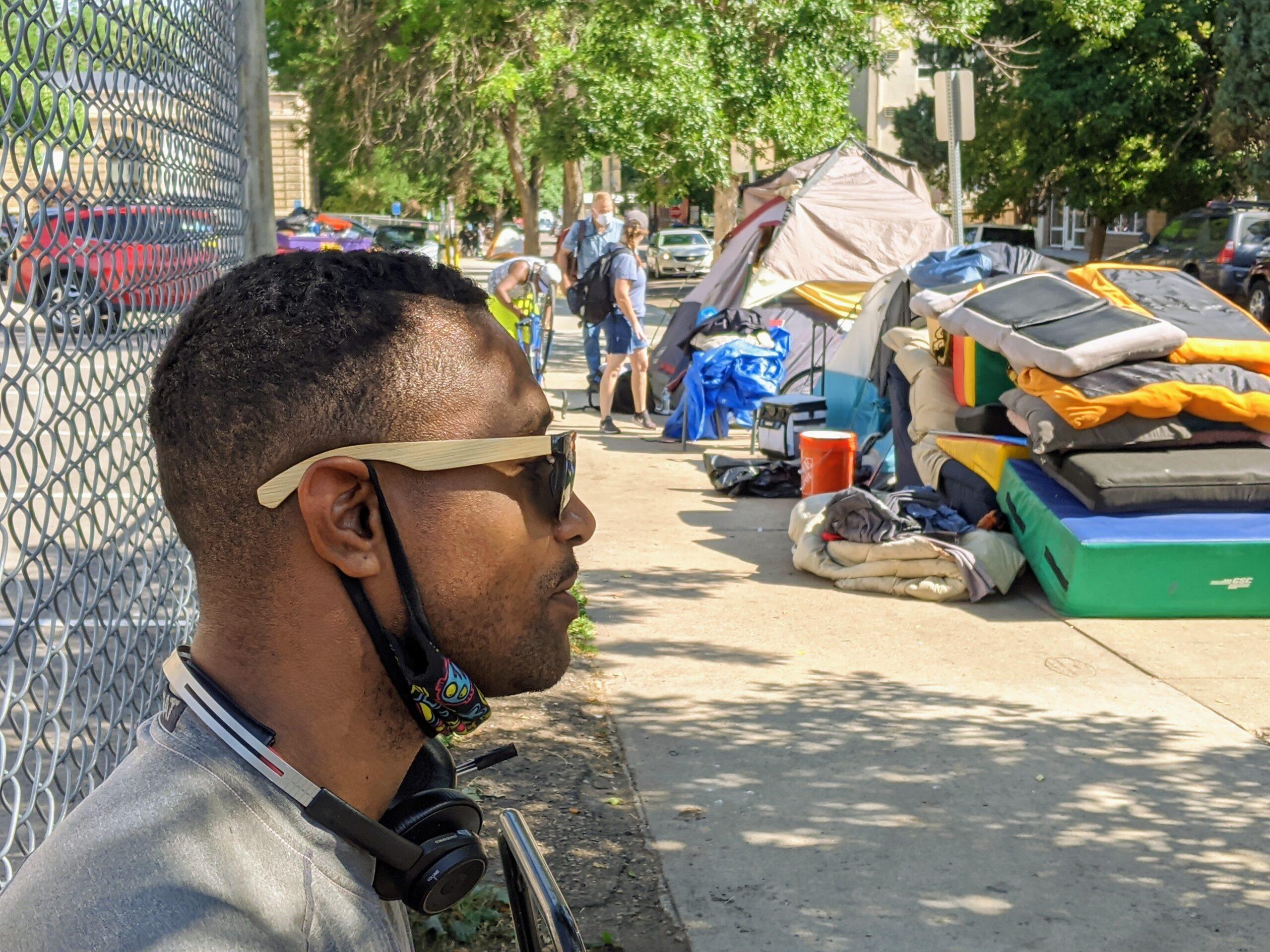Even behind a mask, the woman who will manage Denver's first city-sanctioned campsite was recognized by people in a homeless encampment outside a middle school in Capitol Hill that's grown in recent weeks.
"Did they get that little camp site thing up?" Richard Maxwell asked Cuica Montoya.
Montoya told Maxwell, a barber who has been camping on and off outside Morey school for the last month and a half, that her Colorado Village Collaborative and others were still working to secure a site for what is also known as a safe outdoor space. She said she hoped the site could serve as a camping ground for people like Maxwell soon.
Montoya has been visiting encampments to spread word of her project and gauge interest. But on Monday, she said, "We're just here for support. Whatever that looks like. Which is limited."
On the other side of the school, Terese Howard of the advocacy group Denver Homeless Out Loud was distributing wheeled carts that people could use to move up their belongings ahead of an expected cleanup of the area.
Monday morning at Morey, Montoya, Howard and staff from other nonprofit organizations along with city officials were picking up trash, offering rides to shelters, helping pack belongings, passing out food and sharing what information they had.
Derek Woodbury, spokesman for the city's housing department, said no one took an offer of a ride to a shelter on Monday. But one person asked to place belongings in storage provided by the city. Woodbury added that in recent days 19 people who had been camping at Morey were placed into hotel rooms the city and its partners have secured for people experiencing homelessness who are affected by the pandemic. In addition, Woodbury said, outreach workers were able to reunite five people with relatives and others with substance abuse treatment and housing programs.
An absence of both tension and of law enforcement officers at Morey contrasted with a cleanup last week of an encampment opposite the state Capitol that had been criticized by organizations that support people experiencing homelessness.
Howard said the city's coordination and communication with groups such as hers was better this week than last. But she said the outcome was likely to be similar, with most of the people in tents finding other places in Denver to camp.
"The outreach workers are doing their best," Howard said. "But that doesn't change the reality of what the options were ... to begin with. This city does not have resources that people want. They're not offering housing."
Chris Conner, homelessness resolution director with Denver's housing department, said that even though students in Denver schools will be learning remotely, teachers would be working at Morey starting Thursday. With teachers returning to work soon, Monday's outreach was to help people in the encampment prepare to move, Conner said. He added that it would be up to the city's public health department to determine when campers would have to leave so that the area would be cleaned.
Conner said security concerns had complicated outreach last week at Lincoln Memorial Park opposite the Capitol. He referred to a July 23 shooting near the park that killed one man and injured two people .
"I think my outreach workers feel comparatively more comfortable here," Conner said at Morey on Monday. "Conflict takes a ton of energy. It takes the most energy from people that we're trying to help. Cooperation takes resources."
Conner also spoke to campers, including a young man who told him that he did not want to go to a shelter. Another man, Patrick Wilcox, was using a bungee cord to secure a tarp around a neat bundle of belongings. He planned to leave Morey on Monday.
"I'm going, like, three and a half blocks away," Wilcox said. He said a friend had scouted a spot along an alley where he thought they could set up a small camp.
Wilcox said he had lost housing after the pandemic slowed the economy.
"I had a job washing dishes and had a place," Wilcox said.
Maxwell, the barber who was curious about sanctioned camping, said he had worked at a salon and a barber shop in Boulder, both of which closed when COVID-19 came. He said he had come to Denver in hopes of finding work and cheaper housing. The belongings he had with him on Monday included a black leather bag holding his clippers. He said he had been looking for work.
"A lot of these jobs will turn you down because you're homeless," Maxwell said. "How can you rise above it if you can't get a job? Just because a person's homeless doesn't mean you're a bad person."
Maxwell said he would leave the Morey area soon. But he was not sure where he would go.













